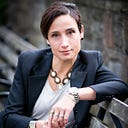Being Autistic Out Loud
I recently came out as neurodivergent. Here’s why that matters.
I am an author, a historian, an editor, and host of a livestream show called The Peculiar Book Club. I have, at one time or another, also been a university professor, a museum professional, and a public intellectual.
I am also autistic.
For most of my life, I’ve been told that success in the former depends upon keeping the latter a secret. And that is a big problem.
When I grew up, the only real reference I had for neurodivergence was Rain Man, a film with Dustin Hoffman playing an autistic savant named Raymond who has been institutionalized most of his life. The film has been praised for bringing “autism awareness.” But it also entrenched the ideas that 1. all autistic people are savants (having a remarkable talent in one area, while suffering in most others), 2. autistic people are or should be institutionalized “for their own good,” and 3. they can’t function in society or make decisions on their own. It created a brand new stereotype, what film-writer Tom Breihan calls “the mysterious and secretly cuddly computer-brained autistic genius” — but one that is never treated as an autonomous figure in his own right. As a child, the message of the movie seemed very clear: Act normal, because if you don’t, you won’t have a voice, you won’t be important. To be different was a weakness, I thought, and weakness was something you should hide.
I hope it’s clear that this is a very wrong and mixed-up idea. But it’s a potent one for an autistic child growing up in a world built for neurotypical people. It’s called masking. It usually involves combinations of behaviors to help you fit in, like forcing eye contact, faking smiles and other facial expressions, hiding your “peculiar” personal interests (and pretending to be interested in more “normative” things), coming up with rehearsed responses or scripting conversations and disguising repetitive or unusual movements or noises (“stimming”). Some of the masking actually hurts, like pushing yourself to endure intense sensory discomfort. But that’s hardly the worst of it. If you spend all your time trying to behave as others expect, you begin to lose yourself, your own identity. Worse, you internalize the idea that your actual self is bad, wrong, weird, not to be shared. At some point, enough of us are hiding that we all become invisible — and the world is left with Hollywood shorthand for what our lives are actually like. What I am like.
I miss social cues. I take things literally. I don’t accurately read the responses of others. Hiding my autism made asking for accommodation or help next to impossible — and because I was convinced I was to blame, I overworked, overreached, and was frequently taken advantage of by those who took (emotionally) more than they gave. Every day, in all my social interactions, I was performing at least three tasks: suppression of my nature, active pretending of a more acceptable nature, and the struggle to decipher and translate one to the other. It’s hard to protect yourself when you’re busy being someone else.
It was, and is, exhausting. It can be very lonely, too. I recall having a friendship dissolve over my inability to provide enough emotional support for someone during a crisis. It never occurred to them that I was, myself, in crisis — paddling furiously and barely keeping above the waves. I didn’t know how to articulate my needs because I’d been taught that my needs were not normative, and therefore illegitimate. Hiding only led to more hiding. It’s little wonder I thought neurodivergent people couldn’t be successful.
It’s well past time to change all that.
I recently “came out” as autistic publicly, in the Scientific American. In that story, I talk about how long the journey has been. I had to become okay with myself, which took a lot of doing. Then I needed to build community. I looked for places of inclusion, where being neurodivergent, queer, strange, nerdy, complicated, gothy, disabled, and otherwise “nonconforming” would be wholly welcome. (I ended up created such a place myself, a book club and show for #peculiars, as I like to call us.) What I realized, of course, is just how many of us there are: all sorts of successful people doing wonderful things all along the spectrum of neurodiversity, from actor Anthony Hopkins to comedian Hannah Gadsby. Even a late diagnosis can lead us to “be kinder” and “not always to take the responsibility.” But public declaration also makes it easier for the next one. And the next.
If we are to overturn old stereotypes and open the horizons for others, especially for young people, then it’s our responsibility to live our autism “out loud.”
Special thanks to Eric Garcia, for his encouragement and wise words. Without your support, I would not have written that first article.

